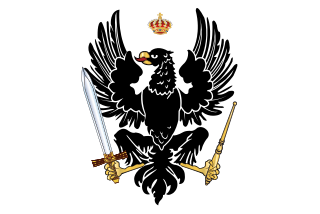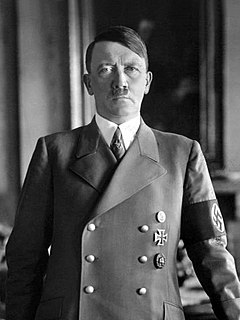
Berlin is the capital and largest city of Germany by both area and population. Its 3,748,148 (2018) inhabitants make it the most populous city proper of the European Union. The city is one of Germany's 16 federal states. It is surrounded by the state of Brandenburg, and contiguous with Potsdam, Brandenburg's capital. The two cities are at the center of the Berlin-Brandenburg capital region, which is, with about six million inhabitants and an area of more than 30,000 km², Germany's third-largest metropolitan region after the Rhine-Ruhr and Rhine-Main regions.

Bavaria, officially the Free State of Bavaria, is a landlocked federal state of Germany, occupying its southeastern corner. With an area of 70,550.19 square kilometres, Bavaria is the largest German state by land area comprising roughly a fifth of the total land area of Germany. With 13 million inhabitants, it is Germany's second-most-populous state after North Rhine-Westphalia. Bavaria's main cities are Munich, Nuremberg and Augsburg.

Germany, constitutionally the Federal Republic of Germany, is a country in Central and Western Europe. It borders Denmark to the north, Poland and the Czech Republic to the east, Austria and Switzerland to the south, France to the southwest, and Luxembourg, Belgium, and the Netherlands to the west.

German is a West Germanic language that is mainly spoken in Central Europe. It is the most widely spoken and official or co-official language in Germany, Austria, Switzerland, South Tyrol in Italy, the German-speaking Community of Belgium and Liechtenstein. It is one of the three official languages of Luxembourg and a co-official language in the Opole Voivodeship in Poland. The languages that are most similar to German are the other members of the West Germanic language branch, including Afrikaans, Dutch, English, the Frisian languages, Low German/Low Saxon, Luxembourgish, and Yiddish. There are strong similarities in vocabulary with Danish, Norwegian and Swedish, although those belong to the North Germanic group. German is the second most widely spoken Germanic language, after English.

The German Empire, sometimes referred to as Imperial Germany, was the German nation state that existed from the unification of Germany in 1871 until the abdication of Emperor Wilhelm II in 1918.

East Germany, officially the German Democratic Republic, was a state that existed from 1949 to 1990, when the eastern portion of Germany was part of the Eastern Bloc during the Cold War. Commonly described as a communist state in English usage, it described itself as a socialist "workers' and peasants' state". It consisted of territory that was administered and occupied by Soviet forces following the end of World War II—the Soviet occupation zone of the Potsdam Agreement, bounded on the east by the Oder–Neisse line. The Soviet zone surrounded West Berlin but did not include it; as a result, West Berlin remained outside the jurisdiction of the GDR.

Nazi Germany is the common English name for Germany between 1933 and 1945, when Adolf Hitler and his Nazi Party (NSDAP) controlled the country through a dictatorship. Under Hitler's rule, Germany was transformed into a totalitarian state where nearly all aspects of life were controlled by the government. The official name of the state was Deutsches Reich until 1943 and Großdeutsches Reich from 1943 to 1945. Nazi Germany is also known as the Third Reich, meaning "Third Realm" or "Third Empire", the first two being the Holy Roman Empire (800–1806) and the German Empire (1871–1918). The Nazi regime ended after the Allies defeated Germany in May 1945, ending World War II in Europe.

World War II, also known as the Second World War, was a global war that lasted from 1939 to 1945. The vast majority of the world's countries—including all the great powers—eventually formed two opposing military alliances: the Allies and the Axis. A state of total war emerged, directly involving more than 100 million people from more than 30 countries. The major participants threw their entire economic, industrial, and scientific capabilities behind the war effort, blurring the distinction between civilian and military resources. World War II was the deadliest conflict in human history, marked by 70 to 85 million fatalities, most of whom were civilians in the Soviet Union and China. It included massacres, the genocide of the Holocaust, strategic bombing, premeditated death from starvation and disease, and the only use of nuclear weapons in war.

The Weimar Republic is an unofficial historical designation for the German state from 1918 to 1933. The name derives from the city of Weimar, where its constitutional assembly first took place. The official name of the republic remained Deutsches Reich unchanged from 1871, because of the German tradition of substates. Although commonly translated as "German Empire", the word Reich here better translates as "realm", in that the term does not necessarily have monarchical connotations in itself. The Reich was changed from a constitutional monarchy into a republic. In English, the country was usually known simply as Germany.

The Axis powers, also known as "Rome–Berlin–Tokyo Axis", were the nations that fought in World War II against the Allies. The Axis powers agreed on their opposition to the Allies, but did not completely coordinate their activity.

Wilhelm II or William II was the last German Emperor (Kaiser) and King of Prussia. He reigned from 15 June 1888 until his abdication on 9 November 1918 shortly before Germany's defeat in World War I.

The Battle of the Somme, also known as the Somme Offensive, was a battle of the First World War fought by the armies of the British Empire and French Third Republic against the German Empire. It took place between 1 July and 18 November 1916 on both sides of the upper reaches of the River Somme in France. The battle was intended to hasten a victory for the Allies and was the largest battle of the war's Western Front. More than three million men fought in the battle and one million men were wounded or killed, making it one of the bloodiest battles in human history.

The German Shepherd is a breed of medium to large-sized working dog that originated in Germany. In the English language, the breed's officially recognized name is German Shepherd Dog. The breed was officially known as the Alsatian in the UK from after the First World War until 1977 when its name was changed back to German Shepherd. Despite its primitive, wolf-like appearance the German Shepherd is a relatively modern breed of dog, with their origin dating to 1899.

Deutsche Welle or DW is a German state-owned public international broadcaster. The service is available in 30 languages. DW's satellite television service consists of channels in English, German, Spanish, and Arabic. While funded by the German government, the work of DW is regulated by the Deutsche Welle Act, meaning that content is intended to be independent of government influence. DW is a member of the European Broadcasting Union (EBU).

Prussia was a historically prominent German state that originated in 1525 with a duchy centered on the region of Prussia on the southeast coast of the Baltic Sea. It was de facto dissolved by an emergency decree transferring powers of the Prussian government to German Chancellor Franz von Papen in 1932 and de jure by an Allied decree in 1947. For centuries, the House of Hohenzollern ruled Prussia, successfully expanding its size by way of an unusually well-organised and effective army. Prussia, with its capital first in Königsberg and then, in 1701, in Berlin, decisively shaped the history of Germany.

The Bundesliga is a professional association football league in Germany and the football league with the highest average stadium attendance worldwide. At the top of the German football league system, the Bundesliga is Germany's primary football competition. The Bundesliga comprises 18 teams and operates on a system of promotion and relegation with the 2. Bundesliga. Seasons run from August to May. Most games are played on Saturdays and Sundays, with a few games played on weekdays. All of the Bundesliga clubs qualify for the DFB-Pokal. The winner of the Bundesliga qualifies for the DFL-Supercup.

Adolf Hitler was a German politician and leader of the Nazi Party. He rose to power as the chancellor of Germany in 1933, and as Führer in 1934. During his dictatorship from 1933 to 1945, he initiated World War II in Europe by invading Poland on 1 September 1939. He was closely involved in military operations throughout the war and was central to the perpetration of the Holocaust. Hitler's actions and ideology are almost universally regarded as evil. According to historian Ian Kershaw, "Never in history has such ruination—physical and moral—been associated with the name of one man."

World War I, also known as the First World War or the Great War, was a global war originating in Europe that lasted from 28 July 1914 to 11 November 1918. Contemporaneously described as "the war to end all wars", it led to the mobilisation of more than 70 million military personnel, including 60 million Europeans, making it one of the largest wars in history. It is also one of the deadliest conflicts in history, with an estimated nine million combatants and seven million civilian deaths as a direct result of the war, while resulting genocides and the resulting 1918 influenza pandemic caused another 50 to 100 million deaths worldwide.

The Holocaust, also known as the Shoah, was the World War II genocide of the European Jews. Between 1941 and 1945, across German-occupied Europe, Nazi Germany and its collaborators systematically murdered some six million Jews, around two-thirds of Europe's Jewish population. The murders were carried out in pogroms and mass shootings; by a policy of extermination through work in concentration camps; and in gas chambers and gas vans in German extermination camps, chiefly Auschwitz, Bełżec, Chełmno, Majdanek, Sobibór, and Treblinka in occupied Poland.
National Socialism, more commonly known as Nazism, is the ideology and practices associated with the Nazi Party—officially the National Socialist German Workers' Party —in Nazi Germany, and of other far-right groups with similar ideas and aims.

























